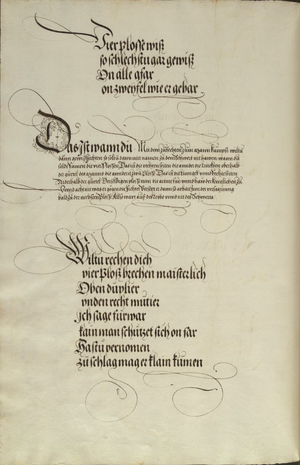|
|
You are not currently logged in. Are you accessing the unsecure (http) portal? Click here to switch to the secure portal. |
User:Kendra Brown/Latin Lew/83v
Jump to navigation
Jump to search
Munich 83v / PDF page 12
Contents
Missing Zettel verse from Dresden 88v (14)
German
- Wiltu rechen dich
- vier Bloß brechen maisterlich
- Oben düplier
- unden recht mütier
- Ich sage furwar
- kain man schützet sich on far
- Hastu vernomen
- zü schlag mag er klain kümen
English
- If you want to avenge yourself
- break four openings masterfully:
- Double above,
- Transmute below correctly/to the right .
- I tell you truly:
- No one defends himself without danger.
- If you have comprehended,
- then he will hardly be able to come to the strike.
83v a
83v a Latin
- Ratio, qua nuditates, quo minus laedantur, tueri licet.
- Si quis acriter et totis viribus contra te feriat,
- et tu conatum adversarij impedire,
- atque curare,
- ne quatuor corporis partes supra modo commemoratas sauciat hostis,
- conaris,
- et is potius invitus laedatur,
- tum conduplationibus contra partem ensis superiorem,
- que firmior dicitur,
- et mutationibus contra infirmiorem utitor,
- eam igitur formam si exercebis,
- facile hostis vulnerabitur,
- neque ullos habitus assumere poterit,
- conduplationes hac ratione exerceto,
- Si adversarius supernè contra te feriat de humero suo dextro,
- vicissim et tu pariter cum ipso de dextro itidem firmiter ferire non dubites caput appetendo,
- eum ictum si parte ensis firmiori hostis exceperit[^1],
- sublatis brachiis,
- manu sinistra nodum ensis tui sub brachium dextrum si co[n]torseris,
- acie longa premissa ex brachiis cancellatis caput ipsius saucies retro ipsius ensem.
83v a English
- The method allows [you] to observe any opening which has been minorly injured
- If anyone strikes against you fiercely and with [their] whole strength,
- and you attempt to impede the attempt of the adversary,
- and to take care,
- [and] the enemy has not wounded the four parts of the body in the way which has been recorded above,
- [moved to line 3]
- and HE having been wounded is more reluctant,
- then by means of repetitions against the higher part of the sword,
- which is called stouter,
- and use alterations against the weaker,
- therefore if you employ this form.
- the opponent is easily wounded,
- and he won't be able to undertake any skill —
- Employ doublings using this method,
- If the adversary strikes against you from above away from his right arm,
- and you in turn equally with the same from the right,
- likewise don't hesitate to strike firmly while seeking the head;
- should the opponent intercept that strike using the stouter part of the sword,
- (the arms having been lifted),
- if you would twine the knob of your sword with the left hand below the right shoulder,
- you would wound his head by means of sending the long edge forward from crossed arms back to his sword
83v a notes
- [^1]: exceperit is the equivalent of 'versetzt er'
- cancellare 1: construct in the form of a lattice or grid; set in a grid; crenellate; bar with a crosswise obstruction. 2: cross the hands or arms, cross the legs, crook a finger. 3: criss-cross or intersect. 4: cancel, cross out. 5: weave about, totter, stagger.
- conduplationes: DMLBS via Logeion says "to repeat". 3/11/19 other locations updated
- compare the various -torsiones verbs with the German.
83v b
83v b Latin
- At si in primo conflictu eius ensem ex latere sinistro tuo contigeris acie longa.
- sublatis confestim brachijs in ipsius ense tuus h[a]ereat,
- verum pòst retro ipsius ensem strictum, acie brevi caput vulneres.
83v b English (needs work)
And if in the first clash the long sharp edge of his sword having been connected from out of your left side. the shoulder/arm having been immediately raised in his sword[,] yours <your sword> would hesitate, truly/certainly afterwards the sword having been drawn close behind, you would wound the head with the short sharp edge.

